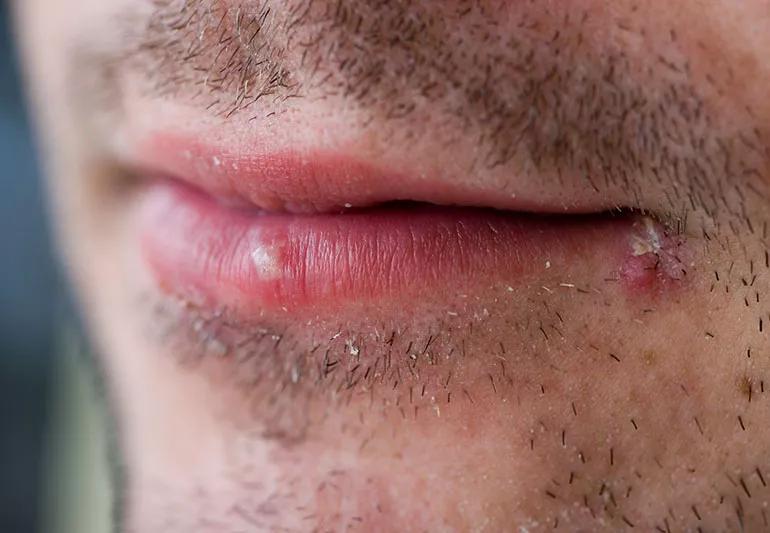Find out when you run the greatest risk of passing cold sores to others and how to talk to your partner about it

Dating is stressful enough without having to worry about an outbreak of cold sores on your mouth. Besides being painful and unsightly, the blisters commonly caused by the herpes simplex virus 1 (HSV-1) are contagious, too.
Advertisement
Cleveland Clinic is a non-profit academic medical center. Advertising on our site helps support our mission. We do not endorse non-Cleveland Clinic products or services. Policy
So what does that mean for your dating life? Is kissing canceled? What about other types of intimacy? Should you tell your partner you have HSV-1?
We talked with dermatologist John Anthony, MD, to get the scoop on cold sores, from when making out is riskiest to talking about it with someone you’re dating.
These small blisters usually appear on or near your lips but can sometimes be inside your mouth as well. They’re often filled with fluid. The blisters usually break, leaving you with a scab that can last a few days. Cold sores heal on their own in a few weeks.
Cold sores are typically spread through kissing and oral sex. HSV-1 is transmitted through touching affected skin that contains the virus or secretions, like saliva. HSV-1 can penetrate closed, healthy skin on your lips and genitals since the skin in those areas is very delicate, says Dr. Anthony.
Previously, people thought HSV-1 was limited to the mouth area, and the related strain, HSV-2, was the one to worry about on the genitals. And it’s true that HSV-1 is usually oral while HSV-2 is typically on genitals. But doctors now know that both types of herpes can infect either location, reports Dr. Anthony.
The bottom line: HSV-1 can make its home in both the oral or genital areas. You can get cold sores from coming into contact with the virus in various ways:
Advertisement
You’re most likely to spread the virus when you have symptoms. These include blister-like sores in and around your mouth. For many people, a tingling sensation or itch precedes a visible outbreak.
Cold sores usually heal within seven to 10 days. But, says Dr. Anthony, that doesn’t mean contact is entirely safe afterward. “You can shed the virus even when you don’t have any lesions. It’s less likely, but there’s still a risk.”
Canker sores are different than cold sores. They usually produce a little white spot and a small ulcer in your mouth that heals within a couple of days. In nearly all cases, canker sores aren’t contagious like herpes-caused cold sores.
“Rarely, a subset of canker sores is associated with the herpes virus,” Dr. Anthony says. “The occasional, one-off canker sore isn’t anything to be concerned about. But for severe and frequent canker sores, your doctor may recommend testing for the herpes virus.”
Discussing health issues isn’t sexy, but it may be necessary. There are a few things to keep in mind when deciding how to talk about HSV-1.
Nearly half of Americans have been exposed to HSV-1 by their 20s. The person you’re kissing may have already been in contact with the virus. If you don’t have any symptoms, the chance you’ll spread it by kissing is relatively low, notes Dr. Anthony — which is why he wouldn’t start off talking about it with someone new.
As intimacy progresses, especially to oral-genital contact, you can give your partner a heads up by saying something like: “I had cold sores in the past. I don’t have any now.” Together, you can make decisions about what you feel comfortable doing based on risk.
Having an active outbreak makes talking about it doubly important since you’re much more likely to spread it. Also, having open sores makes you more susceptible to acquiring a sexually transmitted disease (STD) like HIV from your partner.
Open and honest communication can help protect you and your partner from catching an illness, says Dr. Anthony.
There are ways to lower the risk of spreading HSV-1 to your partner. If you have an active outbreak, avoid letting the affected area touch your partner’s skin. Concerned about transmitting the virus when no symptoms are present? Using a protective barrier like a condom or dental dam can reduce the risk.
If you have a cold sore, a swab test can tell you if it’s caused by HSV-1. No sores? A blood test can indicate if you’ve ever been exposed to HSV-1. (But since so many people have been exposed to the virus in the past, getting a blood test is not necessary for most situations.)
“Testing is most useful if one partner has a history of lots of cold sores and the other doesn’t,” says Dr. Anthony. “If the person without cold sores hasn’t had exposure to the virus, it may be beneficial if their partner takes a preventive medication. The medication suppresses the virus so it won’t pass to the unexposed partner.”
Advertisement
The good news is that although HSV-1 can be troublesome for your dating life, flare-ups are temporary and can be treated — often in the early stages to lessen the severity and healing time. If you have recurring outbreaks, talk to your doctor about preventive treatments.
Advertisement
Learn more about our editorial process.
Advertisement

These common mouth sores are very different — cold sores are caused by a virus and are contagious, but canker sores aren’t

This medicated liquid is available by prescription only and is specially formulated for your specific needs

Lots of things can activate the herpes simplex virus, from the common cold and cold weather to cracked skin and cosmetic procedures

This oral health practice doesn’t have proven benefits, and it’s not a substitute for brushing and flossing

Prescription oral antivirals are your best bet, but OTC creams can help, too

Stay hydrated, use a humidifier and try sugar-free candies or over-the-counter products with xylitol

Non-cancerous ulcers usually heal within a few days or weeks — if it’s sticking around, it’s time to get it checked

Get quick relief with ice chips, popsicles, milk and saltwater

The tropical fruit is a good source of antioxidants and vitamin C

Most people fall asleep within 10 to 20 minutes, but if your experience is different, adjusting your sleep schedule may help

Exploring your hidden side can lead to better understanding of what makes you tick